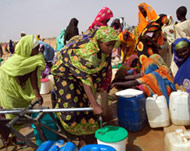Sudan, Chad sign peace deal
Chad and Sudan have signed a peace deal aimed at ending their dispute at the end of a mini-summit in Tripoli hosted by Libyan leader Muammar al-Qadhafi.

The agreement, signed on Wednesday by Omar al-Beshir, the Sudanese president, and his Chadian counterpart Idriss Deby, provides for the re-establishment of relations and the opening of consulates.
It calls for a ban on the use of the territory of either for hostile activity directed against the other and on accepting dissidents from the other.
It also envisages “the creation of a peace force” between the two countries and the establishment of “an African ministerial committee presided over by Libya to oversee the application of the ageeement, and the end of hostile press campaigns and of support to armed groups of the two countries”.
The two presidents welcomed the deal and undertook to respect it.
Libyan plea
Earlier on Wednesday, al-Qadhafi told his counterparts that it was vital they reach agreement among themselves if the continent is to be spared from outside intervention.
He called on Deby and al-Beshir to continue their discussions with their African counterparts until they agreed on a solution to the underlying source of the tension – the three-year-old civil war in Sudan‘s western region of Darfur.
|
“What’s going on in Darfur is the cause of the tension in relations between Sudan and Chad” Muammar al-Qadhafi, |
The presidents of Burkina Faso, the Central African Republic and Congo also attended the summit.
Al-Qadhafi said: “What’s going on in Darfur is the cause of the tension in relations between Sudan and Chad.
“We must resolve this problem, we must not leave this summit until we have found a solution to this problem.”
African solution
The Libyan leader said it was vital that the region’s leaders agree on an “African solution” to the problem in order to “avoid foreign interference and keep the door firmly shut to outside machinations”.
“We have no need of UN peacekeepers – we have our own African forces – and we certainly have no need of the forces of our friend (British Prime Minister Tony) Blair. We can settle our problems ourselves.”
The UN Security Council last week approved contingency planning for UN peacekeepers to take over from an African Union force in Darfur.
 |
|
Al-Qadhafi (R) insisted UN |
But despite strong pressure from Western governments, including Britain, Khartoum has been implacably hostile to the deployment of UN troops.
The Tripoli talks come after Chad declared a “state of belligerence” with Sudan in December after a series of clashes on the Darfur border, in which each country accused the other of supporting dissident groups.
War of words
Al-Qadhafi said the two neighbours had “crossed a red line” with their war of words and called for their desert border to be sealed to prevent fighters’ infiltration in either direction.
“Libya is ready to put 100,000 troops with 1000 tanks and 100 aircraft at the disposal of the African Union to close the border, all our forces are at the disposal of the African Union,” he said.
Human Rights Watch on Sunday called for the deployment of an international force to protect Chadian villagers from what it described as almost daily cross-border raids by militias based in Sudan‘s troubled Darfur region.
The New York-based group accused both Sudanese and Chadian militiamen based in Darfur of killing local people, burning villages and stealing cattle, some with Sudanese government support, including with helicopter gunships.
Darfur has been wracked by conflict since February 2003, pitting ethnic minority fighters against government troops and their Janjawid militia allies.
Up to 300,000 people have died in the conflict and more than two million been displaced.
Fundraising
The UN meanwhile has announced that donor governments would meet in Brussels next month to pledge funds for renewed peacekeeping efforts in Darfur.
 |
|
The United Nations says Darfur |
Radhia Achouri, a UN mission spokesperson, said: “A pledging conference will be held in Brussels next March jointly by the UN and AU to raise funds from international donors for financing operations currently being conducted by the African Union mission in Darfur.”
She said the conference was originally scheduled for 20 February but was postponed without an exact date set.
The AU has said it has no funds to operate beyond March and is considering a handover of its Darfur mission to the UN.
Achouri said the security situation in Darfur “remains volatile with continued armed banditry”.
On 2 February, armed tribesmen attacked three villages under dissident control in South Darfur state, “killing 10 people and wounding several others and torching one village”, she said.